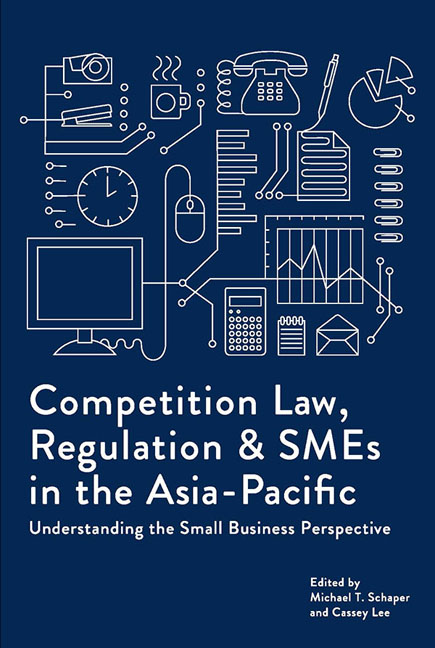 Competition Law, Regulation and SMEs in the Asia-Pacific
Competition Law, Regulation and SMEs in the Asia-Pacific Book contents
- Frontmatter
- Contents
- Foreword
- About the Contributors
- 1 Introduction: Making the Invisible SME More Visible in Competition Policy and Law
- Section 1 Theories And Basic Concepts
- Section 2 Smes And Competition Law
- Section 3 Country Studies
- 12 Competition Law, Regulation, and Trade: Implications for Productivity and Innovation in Singaporean Manufacturing SMEs
- 13 SME Law and Abuse of a Superior Bargaining Position in Japan
- 14 Competition Law, Policy, and Smes in South Korea
- 15 Competition Law Implementation and Smes: Singapore's Experience
- 16 Competition Law and SMEs in Indonesia
- 17 Smes and Malaysia's New Competition Law: Experiences to Date
- 18 Competition Policy and Sme Development in Vietnam
- 19 China's Anti-Monopoly Law and the Sme Sector
- 20 A New Competition Agency Learns to Deal with Smes: The Case of the Hong Kong Competition Commission
- 21 The Regulation of Television Programme Production Contracts under Japan's Subcontract Act
- 22 Small Enterprises and Competition Policy in Pacific Island Countries
- Index
16 - Competition Law and SMEs in Indonesia
from Section 3 - Country Studies
Published online by Cambridge University Press: 05 August 2017
- Frontmatter
- Contents
- Foreword
- About the Contributors
- 1 Introduction: Making the Invisible SME More Visible in Competition Policy and Law
- Section 1 Theories And Basic Concepts
- Section 2 Smes And Competition Law
- Section 3 Country Studies
- 12 Competition Law, Regulation, and Trade: Implications for Productivity and Innovation in Singaporean Manufacturing SMEs
- 13 SME Law and Abuse of a Superior Bargaining Position in Japan
- 14 Competition Law, Policy, and Smes in South Korea
- 15 Competition Law Implementation and Smes: Singapore's Experience
- 16 Competition Law and SMEs in Indonesia
- 17 Smes and Malaysia's New Competition Law: Experiences to Date
- 18 Competition Policy and Sme Development in Vietnam
- 19 China's Anti-Monopoly Law and the Sme Sector
- 20 A New Competition Agency Learns to Deal with Smes: The Case of the Hong Kong Competition Commission
- 21 The Regulation of Television Programme Production Contracts under Japan's Subcontract Act
- 22 Small Enterprises and Competition Policy in Pacific Island Countries
- Index
Summary
The major form of competition regulation in Indonesia is to be found in the Competition (Anti-Monopoly) Law of 1999. A number of other regulations also have an impact on the sector. The Competition Law is intended to help small and medium-sized enterprises (SMEs) by ensuring that they have an equitable opportunity to participate in the economy, fostering a healthy business environment, and protecting them from unfair business practices by larger firms. Current competition issues facing SMEs today include the imbalance and abuse of a dominant position by large chain stores in the retail sector; the conflict between traditional and modern market stores; legacy issues and market distortions from the Soeharto era; and implementation of competition principles at the local and regional levels.
Introduction
Indonesia is not only the largest economy in Southeast Asia, but it is also one of the largest democracies in Asia. As a country with a very big population of more than 250 million people, creating employment has been a persistent policy challenge. For this reason, small and medium-sized enterprises (SMEs) are considered very crucial to the national economy, as they are the largest employment creator, especially amongst women and the ranks of the lowest skilled. Successive Indonesian governments have provided a wide range of programmes to assist small-scale enterprises, and since the 1997–98 economic crisis, SMEs in Indonesia have received more serious attention, as they turned out to be more resilient than larger firms in responding and thriving in difficult times. This government support is also reflected in Article 50h of Indonesia's Competition Law No. 5/1999, which exempts small-scale enterprises from the provisions of the Law (KPPU 2007).
This chapter provides an overview of the current competition environment for SMEs in the Republic of Indonesia. It begins by defining and explaining some of the contemporary features of its SME sector, and then outlines the main elements of the national competition (antimonopoly) law. It examines some of the current problems and cases being dealt with, and concludes with a suggestion for future research into this new field.
MSMEs in Indonesia: Definition and Key Characteristics
One common definition of SMEs in Indonesia is based on the National Law (No. 20 of 2008) on Micro, Small and Medium Enterprises (MSMEs).
- Type
- Chapter
- Information
- Competition Law, Regulation and SMEs in the Asia-PacificUnderstanding the Small Business Perspective, pp. 276 - 291Publisher: ISEAS–Yusof Ishak InstitutePrint publication year: 2016
